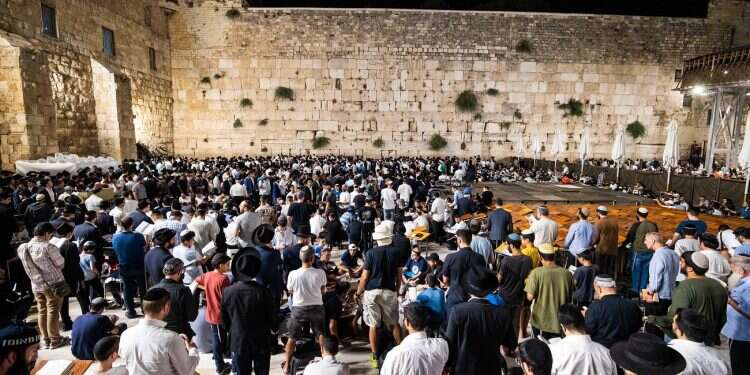If there is one consolation in this year's Tisha B'Av, it's embodied in the gradual return of mutual responsibility and unconditional love to our lives. Cynics may scoff all they want, but it's happening – at a very high price, but happening nonetheless. Oct. 7 and its aftermath have changed something here, and there's reason to believe it's not just for the duration of the war. This shift is coming from the grassroots, from the public, which is finally internalizing that the enemy exploited the terrible rift within us and the near civil war that occurred here, which brought us to the brink of a much greater disaster.
Far more Jewish Israelis understand now that until Oct. 7, we were almost obsessively preoccupied with the bitter internal disputes that accompany our lives here. Too much energy was invested in these arguments. Instead of focusing on those who seek to harm us, we were busy harming each other.
What unites us is greater than what divides us
The talk about the need for internal compromises, the mutual obligation to feel the pain of others and believe that they too desire good, and the recognition that alongside the tribal wars in Jewish society there's also a "unity of the tribes of Israel," are no longer mere lip service.
The understanding that the Jews of this land share a common Jewish hue, a shared past and present of culture, memory, and Jewish existence, and above all, that the whole – the people of Israel – is greater than the sum of its parts and disputes, that what unites us is greater than what divides us, may not be shared by the extremes, but it's permeating through the broader public. In due time, this will also find electoral expression. Those who will try to build themselves up again through division, segregation, and hatred will be harmed.
Contrary to the displays in the current political arena, the broader public sentiment yearns for unity and cohesion. The disagreements haven't disappeared, but there's an understanding that they need to be managed completely differently; that they too have limits, and that compromise, from all sides, can be a not-so-bad solution.
Twice in the modern history of the State of Israel, before Oct. 7, the public received a tangible and chilling example, not just in words, of the concept of unconditional love. The first time, in 1948, when Menachem Begin, facing the Altalena – the Irgun's arms ship engulfed in flames – pledged to avoid civil war at all costs and ordered his subordinates to hold fire against IDF soldiers who had set the ship ablaze on David Ben-Gurion's orders.
The second time was when the settlers of Gush Katif were forcibly uprooted from their homes, the day after Tisha B'Av, 19 years ago, without any real purpose, in what later proved to be a colossal security and moral failure by Ariel Sharon and his government. The settler community, which had sworn to "win with love," refrained from raising a hand against their brothers who evicted them. The evacuees of Gush Katif continued to enlist and even die in service of the state that had evacuated and destroyed their homes. They understood that the national home of the Jewish people, even within narrow territorial boundaries, is greater than any misguided and confused government.
Baseless hatred threatens our existence
There was a third instance as well, which occurred during this war. Heroic fighters, who just weeks earlier had despised and even hated each other, came to save – literally – their brothers and sisters, whether they were bitter rivals or those who shared their views and opinions. After what we went through here in the year preceding the war, this was so far from being taken for granted, and therefore it's permissible to define this too as unconditional love. At the foundation of this unconditional love, like its predecessors, lies the understanding that its opposite, baseless hatred, is something we can no longer afford. That baseless hatred unravels our most delicate and vital seams as a society and threatens our very physical existence.
The historian Josephus tells us about three Jewish armies that fought each other during the siege of Jerusalem, greatly easing the Romans' task of conquering the city. The extremist Sicarii even burned food warehouses intended for fighters and residents. About 2,000 years later, we, the descendants of those besieged Jews, are learning the lesson again the hard way. Let's just not forget it.




